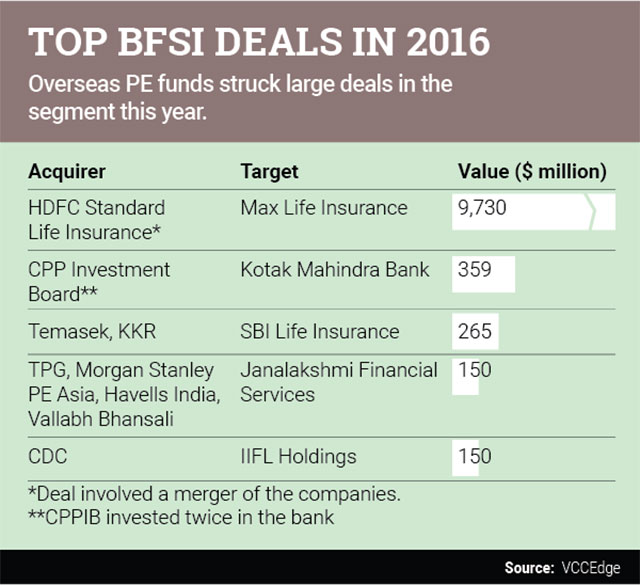The impact of policy decisions made in 2015, such as those related to small finance banks, payments banks and easing of foreign investment caps in the insurance sector, started playing out in 2016.
As such, this year saw a unique combination of uncertainty for many legacy players and growth prospects for new entrants. Over the long term, this is likely to have a lasting impact on the Indian financial services sector, albeit not without short- and medium-term labour pains.
Broadly, the following trends played out in the banking, financial services and insurance segment this year.
Small finance banks and payments banks
After getting in-principle approvals last year, many small finance banks such as Ujjivan Financial and Equitas Holdings tapped into domestic equity markets to comply with the regulatory norm of minimum 51% domestic shareholding and to raise primary capital to launch operations.
“Valuation upsides and a deeper understanding of the opportunity changed investors’ outlook toward small finance banks,†said Kaushal Shah, associate director and head of the financial services sector at Kotak Investment Banking.
Small finance banks are still fringe players but their rise has hit legacy microfinance companies, with many of them struggling to raise equity funding and offering themselves as targets for full-service financial firms.

Payment banks, however, have started making their presence felt, thanks to the government's demonetisation drive and the push towards digital banking. Their emergence has also opened up unlikely partnerships, such as state-owned Bharat Petroleum Corporation picking up a 21% stake in Fino PayTech, and lenders like Kotak Mahindra Bank, State Bank of India and ICICI Bank tying up with Airtel Money, Reliance Jio and Vodafone m-Pesa, respectively.
NBFCs, housing finance firms garner investor interest
Ritesh Chandra, executive director at Avendus Capital said the star performers in the financial services segment for the past year were non-banking finance companies (NBFCs), housing finance companies (HFCs) and small finance banks.
HFCs saw interest from both portfolio and strategic investors in 2016, boosting valuations. This includes the PE investment in Au Housing Finance Company. Smaller players such as Shubham Housing also received investor interest.
Religare Enterprises, controlled by brothers Malvinder and Shivinder Singh, evinced interest for its NBFC business from TPG, Actis and Standard Chartered Private Equity.
“Financial services in 2016 became what New Tech was in 2014-15, in terms of robust investor appetite and new ventures backed by early-stage investors,†said Sumit Jalan, managing director and co-head of investment banking and capital markets for Credit Suisse in India.
Chandra said a segment which will continue to be attractive over the next few years is fin-tech. The segment saw PayU, an online payments company owned by South Africa’s Naspers, acquire India’s Citrus Pay for $130 million.
There were several instances of PE investors acquiring a majority stake in financial services firm. For example, bulge-bracket funds like TPG, Baring Private Equity Asia and IVFA had bid aggressively for ICICI Housing Finance.
In another instance, AION Capital Partners Ltd, along with former senior executives of GE Capital Pramod Bhasin and Anil Chawla, closed the acquisition of the commercial lending and leasing business of GE Capital in India.
Switching jobs
A host of high-profile bankers quit their cushy jobs this year. Some wanted to try their hand at fintech, which shows the potential in the segment, while some others moved on to float their own investment and advisory firms.
Jaspal Bindra, former Asia Pacific CEO at Standard Chartered Bank, joined as executive chairman of Centrum Group. Veteran banker Rajiv Sabharwal resigned from the board of ICICI Bank to consider other options, including taking up entrepreneurship.
Vineet Toshniwal quit as managing director at Equirus Capital, a Mumbai-based boutique investment bank, to launch his fin-tech company. Amit Nayyar quit as executive director at Goldman Sachs Group while Sandeep Pangal left as managing director and head of investment banking at Credit Suisse India.
Deutsche Bank's Asia Pacific wealth management head Ravi Raju left the company after about a decade with the company and Aashish Bhinde, India’s top digital business dealmaker, decided to leave investment banking firm Avendus Capital.
Insurance sees a flurry of action
The lifting of the FDI cap in the insurance sector from 26% to 49% prompted many foreign JV partners to increase their stake in the Indian entity. While some insurers maintained the status quo for multiple reasons such as high valuations, a few others opted for an initial public offering.
Foreign partners that increased their stake in the Indian entity include Tata AIA Life Insurance Company, Birla Sun Life and Reliance Life Insurance.
“Looking ahead, it is likely that some smaller players may look to consolidate with larger players to be more relevant in an under-penetrated market such as India," Kotak’s Shah said.
However, larger players like ICICI Prudential and SBI Life are taking the IPO route. ICICI Prudential launched its IPO in September while SBI Life's IPO is likely next year.
Banks: Demonetisation crimps credit growth
After demonetisation, the softening of yields due to surplus liquidity could help Indian banks in registering Rs 38,200 crore of potential treasury gains for 2016-17, says India Ratings and Research. Those potential treasury gains are significantly large, considering the banking sector reported a Rs 23,600 crore profit for 2015-16 (public-sector banks reported Rs 17,700 crore in losses), said Udit Kariwala, an analyst with India Ratings.
However, the impact of demonetisation is already visible in slowing growth in non-food credit, a proxy to measure overall credit growth in the banking system. The slowdown in asset growth at public-sector banks is being captured by NBFCs. As of 2015-16, the market share of NBFCs in overall credit outstanding was 15%, which is likely to increase to 18% in two to three years.
Chandra said there is a likely to be a transient impact on collections and, consequently, on asset quality due to demonetisation. However, if companies transition their customers to electronic or digital collections, operating expenditure will likely come down and profitability will improve, he said.
Like this report? Sign up for our daily newsletter to get our top reports.







